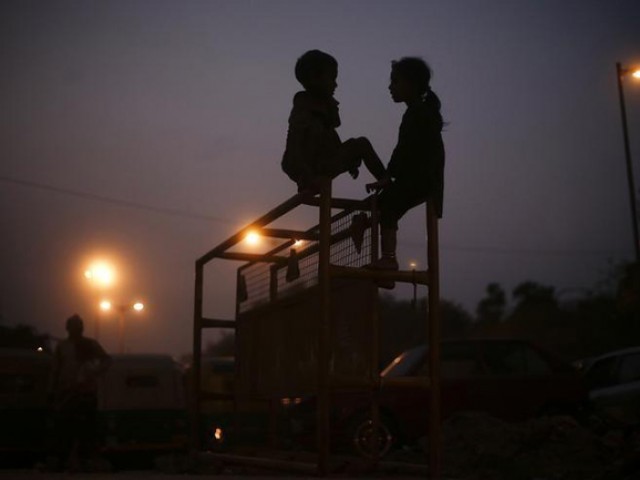
Ali is a fabric trader in Shah Faisal Town, he is a man of modest means with ambitions to develop necessary technical expertise to be employed in a textile company. What is he to do for a girl whom nothing is known about?
He contacts the Subdivisional District Magistrate's office. He gathers as many officials and concerned individuals he can find, and marches forth to the house, unsure of what he'll find, but driven by the fear of what may become of the minor girl.
An informal rescue operation leads to the successful recovery of the girl. Her kidnappers had picked her from a city in rural Sindh, and had destined her for a forced marriage. Ali's interference in the matter saved her from the misfortune - to put mildly - that her 'in-laws' to be had waiting for her.
Ali's inability to ignore a hapless child also led to the arrest of her kidnapper - a dacoit with prize money on his head, wanted by the police dead or alive. Along with that 14-year-old girl, countless other children were saved from his web of human trafficking, kidnapping and other heinous crimes.
It is now 2019. Ali is the founder of Roshni Helpline 1138. He has led rescue operations for thousands of missing children and has managed to recover over 5,100 of them through his helpline.
Over the years, he has worked with numerous non-governmental organisations, including War Against Rape (WAR) - in Lahore and in Karachi, has trained under activists like Asma Jahangir and Hina Jilani, set-up an informal network of search and rescue in Lyari, and established his own NGO, registered as the Roshni Research and Development Welfare Organisation.
Decade of struggle
Recounting his journey, Ali says that it in 1989 it was his inability to ignore the plight of a 14-year-old girl being kept against her will that propelled him in action. However, her case opened his eyes to the atrocities that await young children who wander the streets alone, away from their parents or guardians. Those children are the most susceptible, he says.
Tied by the financial constraints of his family, he continued with his work in the trade of fabrics and textiles while volunteering part time at various social organisations.
In the year 2000, nearly eleven years later, a case emerged that changed Ali's life forever. It was the horrendous act of kidnapping more than a 100 children in Lahore and their barbarous murders by a man named Javed Iqbal. Ali studied that case extensively and concluded that 90% of Javed's victims were homeless and abandoned children who lived on footpaths and railway stations.
Prior to this, Ali had come across child trafficking rings run by slave-dealers who would kidnap and sell off children for camel races in the Gulf States. He also became familiar with Kharkar Camps where children, snatched from their families, were forced into labour. Those children would return to their homes several years later, scarred for life. Many of them had lived through abuse, torture and worse.
In 2001, Ali joined an organisation run by Sahabzada Dawood Abbasi - a member of the royal family of the former princely state of Bahawalpur, who worked for the protection of children from violence and abuse. Ali worked at Abbasi's NGO till 2007.
During that time, another case emerged in Lyari. In 2003, an eight-year-old girl was brutally murdered after being kidnapped and raped. Ali, who played football in Lyari, heard the gruesome details of the incident from his friends in the neighbourhood. He wondered how the girl could not be recovered in time to be saved, especially when, as he observed, most areas in Lyari consisted of close knit communities which knew each other well.
This coupled with his work at various NGOs and his close study of Javed led him to conclude that children's lives were at greater risk when they weren't guarded by their parents or families. He felt that social awareness with regard to children's protection was almost absent. The issue was also largely dismissed by police and relevant authorities, he noticed.
Propelled into action, Ali built an informal network in Lyari for the rescue and recovery of missing children. Through connections established with local mosque administrations, small shopkeepers, blacksmiths, cobblers and transgender persons, Ali accompanied by young vanguards in Lyari, managed to recover children missing from Lyari within hours of their disappearance being reported. So successful was this community-built system that the network soon had the support and cooperation of the police.
The police's involvement, however, put Ali in a tough spot with the gangs that had emerged in Lyari at the time and eventually the network ensuring children's protection was disrupted by members of the Lyari gang-war.
Sensing that it had become increasingly difficult for Ali to combat the issue of missing children in Lyari, his friend advocate Asghar Ali offered him an office space in Rimpa Plaza. It was here that Ali laid the foundations for Roshni Helpline.
Protecting children
Ali warns against the dangers of being inattentive towards one's children. "A small act of neglect can endanger a child's life," he says. While all parents and guardians know how important it is to ensure the safety and protection of one's children, to keep a watchful eye, to warn them against strangers and to be mindful of their activities, Ali reminds that parents and guardians must also confront an uncomfortable truth lest their children suffer.
It is important that a relationship of trust and safety exists among children and their caregivers. "Talk to your child if he or she avoids going to the school, madrassa or meeting any particular relative or acquaintance."
According to him, most children who disappear fall in the bracket of 11 to 18 years of age. These children are susceptible to sexual violence as well as other dangers that prevail and their vulnerability is only heightened when they are unable to vocalise the danger they can sense as sexual violence is not freely spoken about in our society. "Children must be made aware of the difference between 'good touch' and 'bad touch'", he says.
From humble beginnings
Ali's father was a migrant from Jaipur. The family had settled in Karachi and lived in Shah Faisal Colony. The second among four siblings in a middle-income household, soon after Ali graduated from Government Superior Science College, he joined his father in providing for the family. While he'd divide his time between family, employment and volunteer work, it was harder to manage expenses for both his social services and his family. As he felt acutely responsible for both, it is a choice he still struggles with.
"I was worried about meeting the expenses at home. However, if I abandoned my efforts towards the rescue of missing children, who would protect them?" recalls Ali. "Yet, how would I run the house if all my time was devoted to social work?" This conundrum had stayed with Ali for most of his life but it was when him and his wife were expecting their first born that Ali lost all hope. It seemed that he would have to choose between securing the future of his own child and ensuring the safety of other people's children. "It as a perpetual internal battle for me."
The tears in the eyes of the mother whose child had gone missing and her indescribable joy when the child was delivered safely back in her arms, is what kept him going, he says.
Help finally came in the form of ASHOKA International [the organisation recognises and supports entrepreneurs working for social change]. In 2008, Ali was listed as an ASHOKA fellow and in 2010 he received a grant for Roshni Helpline. This led to international recognition and garnered the attention of other organisations such as the British Broadcasting Corporation {BBC), Voice of America and Voice of Germany, among others.
Ali still lives in a rented house but his helpline has now touched thousands of lives and recovered more than 5,100 children. The network of volunteers has expanded to 9,500 people with 4,500 serving in Karachi alone.
Ali carries on with his mission with the same urgency that drove him to rescue that 14-year-old girl in 1989 though. He updates his modus operandi as he goes along - from informal networks to an established NGO, from people on the streets to wide-spread campaigns and mobile applications, he uses every resource available to carry on with his mission.

















COMMENTS
Comments are moderated and generally will be posted if they are on-topic and not abusive.
For more information, please see our Comments FAQ